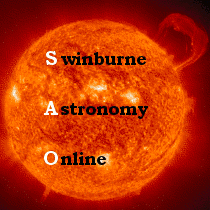Galaxy Formation
Although the formation of galaxies is not fully understood, astronomers have identified the three key processes involved:
- primordial collapse: the collapse of individual gas clouds early in the history of the Universe.
- hierarchical clustering: the formation of large galaxies through the merging of many smaller ones.
- secular evolution: formation as a result of internal processes, such as the actions of spiral arms and bars.
The degree to which each of these processes contributes to the formation of any particular galaxy is thought to depend on the galaxy’s Hubble type. For example, Early-type (elliptical and S0) galaxies are generally thought to have formed early in the history of the Universe. This would suggest that they were formed primarily due to primordial collapse, though mergers are now known to also play a role in their assembly. On the other hand, late-type (spiral and irregular) galaxies show evidence for on-going star formation. This is particularly evident in the disks of spiral galaxies and suggests that secular evolution is key (though both primordial collapse and mergers are expected to play a role).
In summary, while the processes involved in the formation of galaxies have been identified, an understanding of the relative importance of the three processes for each galaxy type is yet to be gained.
Study Astronomy Online at Swinburne University
All material is © Swinburne University of Technology except where indicated.

